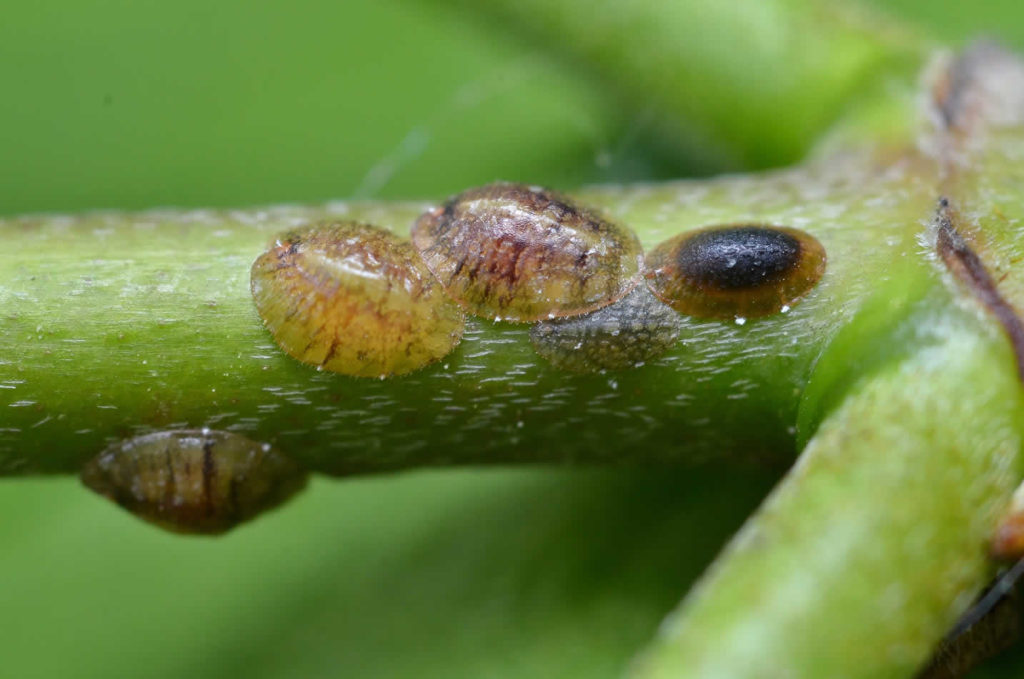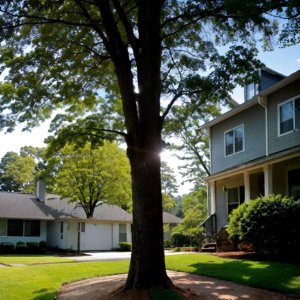
Scale insects are common small insects that latch on to, and can kill, shade trees and shrubs.
The scary part of tree scale insects is that there are so many different kinds. (Over 75,000 in the world.) However, we don’t have that many in Arkansas. What you need to know is that they can kill trees and other plants by sucking out the nutrients from them.
If you suspect you have scales on your trees, don’t wait to contact us as soon as possible. We’ll do everything we can to save your trees and get them healthy again.
Types of scale insects
Typically, scales are categorized into two different types: Soft scales or armored scales. The difference between them is that one type secretes a sugary liquid (known as “honeydew”) and those that do not. Both can seriously injure and even kill trees and plants.
Honeydew is both a nuisance and a threat to plant health. Parked cars, walks, and benches beneath infested trees often become a sticky mess. The sugary liquid attracts ants, flies and wasps. Plants become unsightly when this liquid becomes a food for a black fungus called sooty mold. This mold can shade leaves and reduce plant growth.
Soft scales
Soft scales (Lecanium, kermes and bark scales) produce the aforementioned honeydew. These insects will tap into the parts of trees or plants that move liquid nutrients around the plant.
Armored scales
Armored scales (or pit scales) will not create the honeydew. These creatures have a tube on their mouths that will puncture plant cells, so they can feed on the liquid.
Both of these types of scale insects are dangerous to many (if not most) of the trees and plants common around homes in Arkansas.
More about scale insects
Most scales will spend their entire lives in the same spot on a tree. They literally get so full they are unable to walk any more. However, female soft scales can lay upwards of a 1,000 eggs each (armored scales will lay up to 100 eggs each). That may not seem too big, but if you already have 1,000 soft scales on a tree … that could be 1,000,000 eggs. (Yes, one million eggs!) Now you understand the immensity of the problem they can cause.
An infestation of scales occurs quickly, since the young crawlers can be blown or travel to nearby plants or trees.
In the case of armored scales, the young ones will crawl (or be transferred, somehow) to another place or plant. Once this happens and it begins to feed, these armored scales will flatten out and develop a wax-like shell. This makes them difficult to remove with insecticides.
How to know if you have scale insects on your property
One of the most obvious signs of scale insects is that tree branches (or other plants) are covered with small bumps. These are the actual scale insects.
Other common symptoms of could be:
- Yellowing of leaves
- Premature dropping of leaves
- Dying limbs
- Bark that is cracking
Unfortunately, if a tree becomes infested with armored scales, you will most likely not see any growth and may even watch the tree die. For soft scales, you will notice the honeydew on the fruit and/or leaves of the tree. Often times you will see black mold growing, as well. As well, other insects are attracted to the honeydew and will further damage the tree.
What to do to protect your trees & plants
There are several steps you may need in order to protect your trees and plants from scales. Unfortunately, once most people realize they have scales it is too late to do the simple steps of observation, pruning and plant control.
The best next step is to contact a certified tree specialist who will help you correct the issue by killing the scales.
Typically, Mockingbird Tree Care will come out and do an inspection. Once done, we’ll be able to advise you of the right options and help you correct the problem. Getting an inspection is as easy as one phone call to us!
